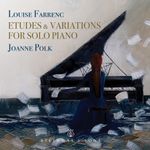|
Back
03/10/2020
“Etudes and Variations for Solo Piano”
Louise Farrenc: Air russe varié – Les Italiennes, opus 14: n° 1 “Cavatine de Norma” – Souvenirs des Huguenots, opus 19 – Etudes, opus 26 – Books I and II
Joanne Polk (piano)
Recording: The Recital Hall of the Performing Arts Center, Purchase College, State University, New York (May 15-17, 2019) – 70’05
Steinway and Sons 30133 – Booklet in English

   
Even when entering the 21st century, things haven’t changed all that much compared to the early 19th century when women were forever in a quest to “break the glass ceiling”. Proverbial male dominance, whose hands endlessly controlled the strings like a marionette, made it difficult, at best, for the female pianist. However, back in the 1800s the playing field was thinly equalized through talent and determination of a select number of ladies, including the likes of Clara Schumann, Fanny Mendelssohn and Louise Farrenc. Why not give more attention to such accomplished women? Enter Joanne Polk whose own milestones have given females more say, no matter the time.
Louise Farrenc’s technical compositions are nothing short of stunning. Though etudes instantaneously bring Chopin and Liszt to mind, Farrenc, nonetheless, was another tour-de-force with an indefatigable mindset in eliciting her own channel of pure virtuosity and technical prowess. Half of the Parisian’s 30 etudes are found inside this compendium with each Book containing pieces of great punctuation and contrast.
Joanne Polk’s valuable quality is how deftly she can weave the power between her left and right hand, giving each “thought” its own pocket of personalized and instantaneous charm. Rollicking (n° 3), elegant momentum (n° 9), courtly melodramatic (n° 10), stupendous (n° 11), pearly graciousness (n° 18), frenetic (n° 22) and “Oh my!” (n° 14) are some of the endless adjectives/explanations that elicit the verve surrounding such compositions. “The faster, the better”, Joanne Polk relishes the challenge to break through two of Farrenc’s most audacious writings, the n° 8 with Czerny-like exercises and the n° 5 with its dizzying, spinning thrills that give determined catches of “sighs”. It’s within this piece that Joanne Polk strongly demonstrates her ambidexterity in moving the melody line from hand to hand while allowing a flummoxing finish which turns innocently on a major chord.
In the early 1800s Louise Farrenc capitalized on French, German and Italian opera by creating virtuosic variations based on a well-known tune. The first case turns to the “Druids Chorus” (ref: “Ite sul colle, o Druidi”) from Norma, giving majestic jubilation to Bellini’s best known opera...”coloratura on the keys”, Polk’s sophisticated depiction shines through and through. Similarly, borrowing from Giacomo Meyerbeer’s Huguenot hymn, “A Mighty Fortress is our God”, the Souvenir des Huguenots’ musical stanzas keep dripping like a dazzling tapestry. While Polk’s pulsating staccato are confidently executed (4’40), it’s the multitudinous roulades (6’00) which give the score a crowning touch.
Awesome on all fronts, Joanne Polk will engage and bedazzle...like a mathematical puzzle in need of someone who can make a logical equation out of the notes with utmost care and careful articulation...Joanne Polk is that one femme brillante.
Christie Grimstad
|